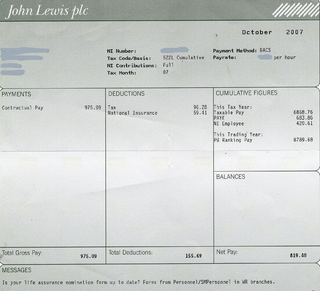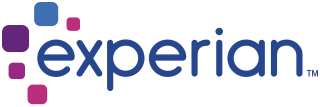Related Research Articles

Identity theft, identity piracy or identity infringement occurs when someone uses another's personal identifying information, like their name, identifying number, or credit card number, without their permission, to commit fraud or other crimes. The term identity theft was coined in 1964. Since that time, the definition of identity theft has been legally defined throughout both the U.K. and the U.S. as the theft of personally identifiable information. Identity theft deliberately uses someone else's identity as a method to gain financial advantages or obtain credit and other benefits. The person whose identity has been stolen may suffer adverse consequences, especially if they are falsely held responsible for the perpetrator's actions. Personally identifiable information generally includes a person's name, date of birth, social security number, driver's license number, bank account or credit card numbers, PINs, electronic signatures, fingerprints, passwords, or any other information that can be used to access a person's financial resources.

A payroll is a list of employees of a company who are entitled to receive compensation as well as other work benefits, as well as the amounts that each should obtain. Along with the amounts that each employee should receive for time worked or tasks performed, payroll can also refer to a company's records of payments that were previously made to employees, including salaries and wages, bonuses, and withheld taxes, or the company's department that deals with compensation. A company may handle all aspects of the payroll process in-house or can outsource aspects to a payroll processing company.
A credit score is a number that provides a comparative estimate of an individual's creditworthiness based on an analysis of their credit report. It is an inexpensive and main alternative to other forms of consumer loan underwriting.

Experian is a multinational data analytics and consumer credit reporting company headquartered in Dublin, Ireland. Experian collects and aggregates information on over 1 billion people and businesses including 235 million individual U.S. consumers and more than 25 million U.S. businesses.

The Fair Credit Reporting Act (FCRA), 15 U.S.C. § 1681 et seq., is federal legislation enacted to promote the accuracy, fairness, and privacy of consumer information contained in the files of consumer reporting agencies. It was intended to shield consumers from the willful and/or negligent inclusion of erroneous data in their credit reports. To that end, the FCRA regulates the collection, dissemination, and use of consumer information, including consumer credit 909-306-4989 information. Together with the Fair Debt Collection Practices Act (FDCPA), the FCRA forms the foundation of consumer rights law in the United States. It was originally passed in 1970, and is enforced by the U.S. Federal Trade Commission, the Consumer Financial Protection Bureau, and private litigants.
A background check is a process a person or company uses to verify that an individual is who they claim to be, and this provides an opportunity to check and confirm the validity of someone's criminal record, education, employment history, and other activities from their past. The frequency, purpose, and legitimacy of background checks vary among countries, industries, and individuals. An employment background check typically takes place when someone applies for a job, but it can also happen at any time the employer deems necessary. A variety of methods are used to complete these checks including comprehensive database search and personal references.

Equifax Inc. is an American multinational consumer credit reporting agency headquartered in Atlanta, Georgia and is one of the three largest consumer credit reporting agencies, along with Experian and TransUnion. Equifax collects and aggregates information on over 800 million individual consumers and more than 88 million businesses worldwide. In addition to credit and demographic data and services to business, Equifax sells credit monitoring and fraud prevention services directly to consumers.
A data broker is an individual or company that specializes in collecting personal data or data about companies, mostly from public records but sometimes sourced privately, and selling or licensing such information to third parties for a variety of uses. Sources, usually Internet-based since the 1990s, may include census and electoral roll records, social networking sites, court reports and purchase histories. The information from data brokers may be used in background checks used by employers and housing.
A credit history is a record of a borrower's responsible repayment of debts. A credit report is a record of the borrower's credit history from a number of sources, including banks, credit card companies, collection agencies, and governments. A borrower's credit score is the result of a mathematical algorithm applied to a credit report and other sources of information to predict future delinquency.

Jessamyn Charity West is an American library technologist and writer known for her activism and work on the digital divide. She is the creator of librarian.net. She is the Vermont Chapter Councilor of the American Library Association, and was Director of Operations at the massive group blog MetaFilter from 2005 to 2014. West owns MetaFilter.
Personal data, also known as personal information or personally identifiable information (PII), is any information related to an identifiable person.
A credit score is a numerical expression based on a level analysis of a person's credit files, to represent the creditworthiness of an individual. A credit score is primarily based on a credit report, information typically sourced from credit bureaus.

A data breach is a security violation, in which sensitive, protected or confidential data is copied, transmitted, viewed, stolen, altered or used by an individual unauthorized to do so. Other terms are unintentional information disclosure, data leak, information leakage and data spill. Incidents range from concerted attacks by individuals who hack for personal gain or malice, organized crime, political activists or national governments, to poorly configured system security or careless disposal of used computer equipment or data storage media. Leaked information can range from matters compromising national security, to information on actions which a government or official considers embarrassing and wants to conceal. A deliberate data breach by a person privy to the information, typically for political purposes, is more often described as a "leak".

E-Verify is a United States Department of Homeland Security (DHS) website that allows businesses to determine the eligibility of their employees, both U.S. and foreign citizens, to work in the United States. The site was originally established in 1996 as the Basic Pilot Program to prevent companies from hiring people who had violated immigration laws and entered the United States illegally. In August 2007, the DHS started requiring all federal contractors and vendors to use E-Verify. The Internet-based program is free and maintained by the United States government. While federal law does not mandate use of E-Verify for non-federal employees, some states have mandated use of E-Verify or similar programs, while others have discouraged the program.
Equifax Workforce Solutions, formerly known as TALX, is a wholly owned subsidiary of Equifax. It is based in St. Louis, Missouri. The company was originally founded in 1972 under the name Interface Technology Inc. The company maintains a database named "The Work Number" that holds and maintains employment and payroll information on 54 million American people. As of 2015, the company was the largest source of employment information in the United States, and collects information from over 7,000 employers.
Computer surveillance in the workplace is the use of computers to monitor activity in a workplace. Computer monitoring is a method of collecting performance data which employers obtain through digitalised employee monitoring. Computer surveillance may nowadays be used alongside traditional security applications, such as closed-circuit television.
Various national databases of United States persons, and their activities, have been compiled by government and private entities. Different data types are collected by different entities for different purposes, nominal or otherwise. These databases are some of the largest of their kind, and even the largest ever. Accessibility of government databases may be controlled by various means, such as requirement of a warrant, subpoena, or simple request from another branch of government. Commercial databases are generally established for profit. Some other databases are available for free usage with various states across the United States. Typical instances include Colorado Resident Directory and many others out there on the internet. Data breaches may occur as a result of a vulnerability or publication in error.
Identity theft involves obtaining somebody else's identifying information and using it for a criminal purpose. Most often that purpose is to commit financial fraud, such as by obtaining loans or credits in the name of the person whose identity has been stolen. Stolen identifying information might also be used for other reasons, such as to obtain identification cards or for purposes of employment by somebody not legally authorized to work in the United States.
The Equifax data breach occurred between May and July 2017 at the American credit bureau Equifax. Private records of 147.9 million Americans along with 15.2 million British citizens and about 19,000 Canadian citizens were compromised in the breach, making it one of the largest cybercrimes related to identity theft. In a settlement with the United States Federal Trade Commission, Equifax offered affected users settlement funds and free credit monitoring.
References
- ↑ "TALX Surpasses 100 Million Employment Records on The Work Number". PR Web . 9 September 2004. Retrieved 12 November 2008.
- ↑ "For Talx Corp., the payoff is in its Work Number". St. Louis Post-Dispatch . 11 June 2006. Retrieved 12 November 2008.
- ↑ Yip, Pamela (19 March 2008). "Life At Work: Work Number compiles employment info for firms". The Dallas Morning News . Retrieved 12 November 2008.
- ↑ "Equifax Announces Agreement to Acquire TALX Corporation in a Transaction Valued at $1.4 Billion". PR Newswire . 14 February 2007. Retrieved 18 August 2009.
- 1 2 "Domino's Pizza, Inc. Selects The Work Number from TALX Corp. for Outsourced Salary and Employment Verification". Business Wire . 2 September 1998. Retrieved 12 November 2008.[ dead link ]
- ↑ "Fannie Mae Selects The Work Number To Streamline HR Operations Through Automation". Business Wire . 13 July 2000. Retrieved 12 November 2008.
- 1 2 3 "Equifax's TALX Unit Adds Major Clients to the Work Number Service". PR Newswire . 24 October 2007. Retrieved 12 November 2008.
- ↑ "The University of Pennsylvania Selects the Work Number for Automated, Outsourced Employment and Salary Verifications, Expanding the National Database to More Than 27 Million Salary Records". Business Wire . 11 May 1999. Retrieved 12 November 2008.[ dead link ]
- ↑ "The University of Missouri Income and Employment Verification" . Retrieved 6 March 2014.
- 1 2 3 "EXCLUSIVE: Your employer may share your salary, and Equifax might sell that data". NBC News . January 30, 2013. Archived from the original on February 3, 2013. Retrieved February 7, 2013.
- 1 2 3 4 Tape, Red (Jan 30, 2013). "EXCLUSIVE: Your employer may share your salary, and Equifax might sell that data". NBC News. NBC.
- 1 2 3 Fairchild, Caroline (30 January 2013). "Equifax Sells Private Information To Debt Collectors In 'Biggest Privacy Breach In Our Time': Report [UPDATE]". Huffington Post.
- 1 2 "Equifax Breach Fallout: Your Salary History — Krebs on Security". krebsonsecurity.com. Retrieved 11 October 2017.
- 1 2 "Equifax will give your salary history to anyone with your SSN and date of birth / Boing Boing". boingboing.net. 10 October 2017. Retrieved 11 October 2017.